(Author’s note: For the record, I have nothing against pot and I like hippies. This story happens to be true however, and the person in question was a bit pretentious which I found funny.)
I once knew a pot-head hippie who lived in a tent on two acres of pine forest just outside of Austin, Texas. He had a pile of wood on the property which he claimed he was going to use to build a music studio, but I think he was more interested in cultivating his garden of marijuana plants instead. He had a nasty scar between the eyes which I tried not to stare at or ask any questions about.
He was the musical director of a play I was in, and after rehearsal one night he asked me for a ride home because his car was in the garage for repairs. When we arrived he invited me to walk through his woods to the tent for a glass of rotgut whiskey on the rocks. As he was pouring the cheap liquor he said he always gave something to anyone who did him a favor so they couldn’t accuse him of being ungrateful later. We discussed the possibility of writing an opera based on a play of mine which ended with my father snoring. He swore a snore was in the key of G flat. I swore I would never let myself get so bored that I would have this type of discussion with a pot-head hippie again.
“I guess you wonder where I got this scar,” he finally said.
Admitting my curiosity, I expected a story of a fight with a bunch of bikers. He wasn’t a biker himself. He was kind of puny but had a real sarcastic mouth on him. Most people smart enough to belong to Mensa usually do, which can provoke bikers to want to beat them up. But no, he responded, it happened right there on his happy two acres of wilderness.
“If you notice,” he said, pointing with his full glass of whiskey, “I have my phone attached to that tree over there. It didn’t used to be so close. Originally I had it on a tree by the road. I thought the longer it took for me to answer the phone the more likely unwanted callers would just hang up.”
I nodded. I had learned not to argue with a man who had an outdoor john, showered with a garden hose and bought a bag of ice every night to keep his bacon and eggs fresh. It was easier that way.
“Anyway, one night I heard the phone ring and I jumped out of bed and ran to answer it. I sleep naked so there I was at one with nature, the moon shining, the crickets chirping and me just as God made me. I felt at one with nature, running just like a wild animal through the trees. The only thing was, I forgot there was a low hanging limb between the phone and me. I hadn’t cut it because I figured anyone who really wanted to see me should have to go to the trouble of lifting the branch as he came down the path. It caught me right between the eyes. I couldn’t afford stitches so I just let it heal on its own.”
I guess he also forgot he was a whole lot taller than the average wild animal running through the woods at midnight. Actually, the average wild animal would have had enough sense to let the phone ring.
Tag Archives: storytelling
Burly Chapter Twenty

(Previously in the book: For his birthday Herman received a home-made bear, which magically came to life. As Herman grew up, life was happy–but mama died one night. Papa decided sister Callie should go live with relatives. Brother Tad tore up the burlap bear Mama had made for him. When World War II began, Tad enlisted.)
Herman did as Tad asked him; he wrote to Callie and gave her Tad’s address when he received it. The exchanging of letters between the three seemed to draw them closer together than they ever had been living in the same house. Callie and Herman exchanged bits of information that Tad would put in one letter but not in the other. And Herman would pass on news to Tad that Callie forgot to write him.
Every now and again Herman would offer to let papa read one of Tad’s letters, and, to his surprise, papa said yes. Herman watched his father read the letter and noticed how his brow would knit in concern. Another thing he saw, something he had never noticed before, was that his father moved his lips as he read and he read painfully slow. It seemed odd to Herman who read very fast.
“Your father doesn’t read very much,” Burly explained when Herman mentioned this trait to him, “and if you don’t do something very often you don’t do it well.”
Reading was something that Herman did very well. Ever since Callie left, Herman retreated to the loft and to conversations with Burly and reading every book in the school library. He would tell Burly about the stories in the books in his own words and Burly bounced up and down in excitement, for he didn’t know much of the world beyond the loft. Herman’s interest in reading grew as he wrote Callie about the books he was reading, and she suggested other books to him. Callie, it turned out, loved to read too, and their letters would be filled with debates over which books were better and which writers could bring people springing from the pages to live in their minds.
His letters to Tad were different, however. Herman wrote mostly about what was happening on the farm, how papa was and how his friends in town were. Prices were good for the crops and the last year they could afford to hire a young Mexican-American man named Manuel to be a farm hand. Papa was the same–hardworking and silent. Leonard was still in town, telling anyone who would listen that he wasn’t dumb enough to volunteer. Stevie joined the Marines, but no one knew where he was stationed.
Herman smiled a bit when he got Tad’s letter in return. Tad warned about trusting the farm hand. You know how “those” people were, he wrote. And he sounded a bit hurt that papa hadn’t written directly to him, but he was glad Herman was keeping him informed about the “old man.” Tad wasn’t surprised Leonard was still hanging around town. I wouldn’t be surprised if he found a way out of the draft, Tad joked. And he hoped Stevie didn’t get sent anywhere too dangerous. The Marines were the first to go into unsafe places, he told Herman.
“I hope nothing happens to Tad,” Herman said to Burly one night after reading one of his brother’s letters. “He’s changed a lot since he’s been in the army. He looked down at his little burlap friend and smiled. “Or am I the one who has changed?”
“You both have changed,” Burly replied. “You both are growing up.”
Yes, Herman told himself, the last couple of years had gone very fast. He was now a big fourteen-year-old and could work almost as long and as hard as his father. Papa no longer walked by and told him he had worked enough for the day while the sun was still high in the sky. When he told Herman to stop he was walking back to the house himself.
Mr. Cochran didn’t help out anymore, since they had hired Manuel. But every time Mr. Cochran saw them in town he would smile and wave. “You’ve got a good boy there, Horn,” he always said, winking at Herman.
And papa always said nothing.
“It doesn’t seem to bother you very much anymore that your father doesn’t brag about you, does it?” Burly asked.
Looking out the loft window, Herman replied, “What’s there to say?”
The next day Herman received two letters, one from Tad and one from Callie. Tad was all excited because his unit was ready to move out of England. He couldn’t say where they were going or exactly when but that it could mean the end of the war. By this time Tad had made sergeant, a fact which made papa very proud and caused him to call out the news to Mr. Cochran when he saw him in town. Callie’s letter was filled with anticipation of her senior year in high school. She just knew it would be the happiest year of her life. Herman could see from the pictures she had sent him Callie had become a beautiful fair-haired young woman, triggering Herman’s fading memories of his mother. She said Tad had written her that he might be home soon, that “we were going to win the war any time now.”
“I hope he’s right,” Herman said with a sigh.
“I hope so too,” Burly agreed.
Herman continued to read Callie’s letter. She said she had a special shelf in her room for Pearly Bear and had made her a pretty new dress. All of her girlfriends who spent the night with her thought Pearly was very cute.
Burly shuffled a bit. If he weren’t made of burlap he would cry. He missed his mother very much, but he was happy she was being treated well. Not like poor papa bear.
Callie asked in her letter if Herman had read in the newspaper about the big invasion of France in June. They called it D-Day and expected it to be the beginning of the end of the war. “At least I hope so. By the way, have you heard from Tad lately? I last got a letter from him sometime in May.”
Herman looked at the postmark on his letter from his brother. It was postmarked in early May. Oh well, he thought, mail always ran slow from servicemen.
The next day a telegram from the government arrived. From talk at school Herman knew what it was, and he froze.
“Well, open it, son” papa said.
Herman slowly opened the telegram and began to read the words, “We regret to inform you—“
Papa grabbed the telegram from Herman’s hands and stared at the words on the paper. His lips quivered as they moved along with his eyes. Finally he wadded it up and walked into the house without saying anything.
His son was dead.
Herman’s first impulse was to go to his father and put his arms around him and cry with him, but something inside told him to leave his father alone. Perhaps it was his memory of when his mother died and the men had to fight papa away from his wife’s side. At any rate, Herman let his father grieve by himself.
Burly didn’t have to be told. “Tad’s dead, isn’t he?”
Herman nodded as he crawled into his bed. “How did you know?” he asked softly.
“I heard your father slam his bedroom door and cry.” Burly nestled into Herman’s side. “I’m sorry, Herman.”
And then Herman cried.
There could be no funeral because Tad’s body was buried in France somewhere, but the Army was going to present a flag to papa at a memorial service. Herman went to Mr. Cochran’s house to call Callie in Houston.
“Hello?” Aunt Joyce answered.
“This is Herman,” he said soberly. “May I speak to Callie?”
“It’s Woody, isn’t it?” she asked.
“No.”
“Oh no,” she gasped.
Herman heard muffled sounds as Aunt Joyce put her hand over the receiver to call Callie to the phone.
“Herman, Tad’s dead, isn’t he?” Callie asked.
“Yes.” Herman couldn’t say anymore because he was afraid he would cry again.
“I could tell by the way Aunt Joyce was acting. Are you all right?”
“I guess.”
“I’ll be home tomorrow.”
And Callie, accompanied by Uncle Calvin and Aunt Joyce, was back on the farm near Cumby the next day. She tried to hug her father but he pulled away. This time she didn’t look hurt, just sad.
There was no bear family reunion; Callie left Pearly in Houston. Burly was disappointed, but he didn’t say anything to Herman. He could tell his young master had other things on his mind.
The ceremony was held the next day at the local cemetery. A veterans group had bought a plot and placed a large tombstone with the names of the war dead from Cumby whose bodies would never return to Texas. A military color guard went through its paces, marching the flag to the monument. The flag was folded and presented to papa who received it without emotion. Callie held Herman’s hand tightly.
Camping

(Author’s note: In honor of the summer camping season for families, the long weekends, the smells of grilling, the setting suns, the whistling and the laughter. Ah, the memories.)
After a long day of camping I lay in my tent alone looking through the flap at the navy blue sky filtered through patterns of oak branches. The family had walked down to the campground store to buy candy for the kids.
Whiffing, I knew the next campsite over was roasting hot dogs. On the other side someone else was grilling hamburgers and across the way the aroma of toasted marshmallows floated my way. We had been lazy and stopped at a restaurant for dinner after a long day of hiking a mountain to see a waterfall.
My legs still ached, and I thought I was getting a blister on my big toe. I didn’t want to complain because my wife had twisted her ankle last night after she tripped on the way back to the tent from the campground toilet. She made the trip up and down the mountain limping so I couldn’t say much about a little blister.
Cricket song was deafening among the trills of the birds. Most of the campers around us were keeping their voices down, which was a good sign for later. A couple of nights ago, one guy drank a few too many beers and sang out loudly, “I’m going white-water rafting tomorrow and the damn Little Pigeon River!” My wife sent me to the office the next office to complain but the manager said he had refunded their money and told them to leave. I was glad I didn’t have to listen to them anymore but I resented the jerk got a free campsite for a night. Maybe on our last night I could scream obscenities and get a refund too. I dismissed the thought. It wasn’t worth losing the sleep.
I stared at the leaves against the sky. If I could draw, it would make a great abstract painting of shades of blues. Then the stars started twinkling adding to the composition. Wouldn’t that make a nice painting for your bedroom wall? You could just stare at it until you drifted off to sleep. But with my luck it would look like a mess and I’d stay awake wondering why I thought I could paint in the first place.
Rolling over on the air mattress I searched for the bag of candy from out visit to Aunt Mahalia’s Kitchen. I hoped there would be some fudge or chocolate covered cherries left. No fudge but plenty of cherries. Life is good. I bit into the chocolate mound and slurped up the cream, saving the actual cherry for last. The soothing, mellow milk chocolate made me forget about the blister, and the tart sweet cherry made me forget the chocolate, if that were possible.
I heard familiar laughter come up the path. The family was back. I hoped they bought more fudge. My son was whistling the music to Star Wars. Anytime he was happy he whistled the entire score of the movie. My daughter giggled and talked at the same time. I never knew how she could do that. My wife said, “Let’s hurry up and get back. My foot is killing me.”
I paused to take in everything and store it for future reference. This was one of the good times.
Ireland and England with Jerry and Josh–The Castle and the Tower
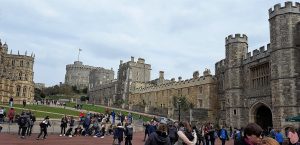
Nope, these pictures weren’t taken at the royal wedding. About a month and a half earlier. As it happens sometimes on group tours, choices are offered. You can either go to Windsor Castle or you can go to the Tower of London, but not both. Josh got the castle; I got the tower. Since I wasn’t there, Josh will supply the news about Windsor:
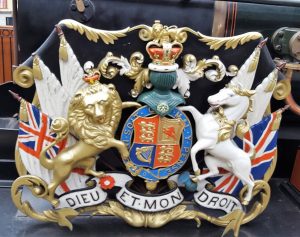
After the London tour, we split up into our respective groups: Dad went to the Tower (no pun intended) and I joined our lovely and talented long-term guide Fiona for our trip to Windsor Castle. The drive was an hour or so and once there we were led on a brief mini-tour of the outer courtyard. Like all castles in Ireland, Wales and England, the original purpose of the castle was as a military installation and position. However, both me and my kneecaps were grateful for the evenly cut stone steps. The guide mentioned that the moat area, as was with all medieval castles, were often filled with tar, sewage and god-knows-what other disgusting substances to impede the progress of an invading army. I can’t remember if it was Stuart or the temporary guide we had at Windsor, but it was mentioned that Windsor Castle in particular held a fond place in the Queen’s heart due to her growing up there. The guide mentioned that the Queen usually spent the work week at Buckingham Palace in London and came to Windsor to rest and recover. I couldn’t fault her choice in residence: the area around Windsor is absolutely stunning. Probably one of the most stunning facts was that the Queen was the only person in Windsor and England as a whole who did not have to drive with a driver’s license. The Windsor guide mentioned that this was because all driver’s license in the country were issued in the Queen’s name and authority. On one hand, it made sense not to issue a license to the one person whose name and authority were used for issuing purposes. On the other hand, I made a mental note to look out for elderly women in the driver’s seat whenever I was in England.
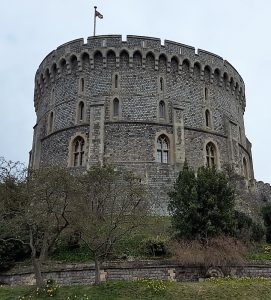
After the outside tour, my group, which consisted of several high school students, got in line for the main tour of the interior. All of the attendants dressed in the blue and red uniforms of House Windsor (for a heartbeat, I confused them with the local police) were walking up and down the line making sure no one took pictures. For the record, I did manage to take one picture of the interior but later deleted it from my cell phone. Let it never be said that a son of the Cowling family disrespected the house rules of royalty. Like the outside of the castle, the stairs were evenly cut and spaced. One of the first rooms we visited was the one where that horrible fire in the ‘90s started. I’m glad that the English really take care of their national treasures and monuments. While passing through, I couldn’t help but wonder how the heck was a thief going to fence all of the priceless art, tapestries, and fine china without causing a stock market crash, let alone get out of the castle alive with the goods. The tour took roughly an hour and when we exited we were right at the souvenir shop. Dad was writing a novel so I took the liberty of buying two or three books regarding the Royal Family and Windsor Castle. While waiting outside for the rest of the group, I was sitting with two or three teenage girls from are group and I saw a water-bottle machine that took 2 1-pound coins. I scrounged my pockets but only had one, so I asked my traveling companions if they had a spare coin. They started rummaging through their purses and I think it was the only blonde in the group who had a coin. I thanked her profusely and got up to get something to drink. When I got back, we started talking about the tour and trip in general when I realized how much the redheaded girl in our group looked like Sophie Turner AKA Sansa Stark from Game of Thrones. I asked her if she had been watching the series and she said only up to season three. I then asked if any one told her that she looked just like Sansa Stark because she certainly did. She thanked me generously and said no one had mentioned it before. I would have loved to go walking around the rest of the town but we finally had to depart for our final night in London itself. That was probably my favorite day of the trip because I was not only one of the group chaperones but also a surrogate older brother to the young ladies of the group. Heather, please sit up and take notes: THIS is how brothers and sisters should get along. Anyway, Back to you, Dad.
I went on the tour of the Tower of London with our teacher guide and her sister. As soon as we entered both of them said they felt like they had been there before. But not in the same way they said they felt like they had come home when we were in Ireland. As we walked around the grounds we found a water fountain memorial to everyone who had been beheaded on that spot. In the center was a lovely pillow carved from a clear quartz. It reminded me of the pillow used in fairy tales to hold a crown or a princess’s slipper. Then I remembered what landed on the pillow: a head. As the sisters went around the fountain both of them felt a bit queasy. They realized why the place seemed familiar, in a very uncomfortable way.
Inside we went through the line of historical exhibits on our way to see the crown jewels. The nice feature was the moving sidewalk on each side of the cases of crowns and scepters. Everyone got a nice close-up view without having to wait for someone to gaze upon the artifacts as though they were the only ones in the building. (We’ve all run into those types at museums before.)
Anyhow, here it is a month and a half later and my seventy-year-old body is still recovering. But I wouldn’t have missed this trip for anything
Ireland and England with Jerry and Josh–The Best Tour Guide Ever
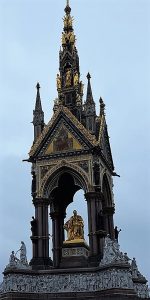
On our last morning to roam London, we got the best tour guide ever to give running commentary on the sights passing by the bus windows. If my memory serves me correctly—which it rarely does anymore–his name was Stuart. He matched from head to toe in shades of green, blue and gray. Even his shoes. I was hoping he would break into song and tap dance down the center aisle of the bus. But he was a proper gentlemen, and they don’t exhibit their choreography on public transport.
At one of our first stops he let us hop off the bus to examine the massive statue of Prince Albert. It was in a beautifully manicured park across the street from Royal Albert Hall. Unlike most people preserved for posterity in the many parks, squares and circles about London, Albert received full Olympus treatment. U.S. General Dwight Eisenhower was honored with a life-sized replica; others were remembered with a head and shoulders bust, and most were in bas relief plaques explaining who they were and why they were honored. But Albert, the royal consort to Queen Victoria and father to so many children I cannot begin to remember all their names, sits high, broad and proud. I do not know if the statue is gold or bronze, but it shone for all to see. This is magnificent memorial of a woman’s love for her husband.
Back on the bus, our elegant guide directed the bus driver past the monument to Lord Wellington. “Does anyone know what Wellington did?”
Josh piped up, “He beat the crap out of Napoleon.”
Stuart appraised my son a moment looked at our long-term guide and said, “I think I like him.”
A little while later we drove by a monument to King Henry VIII, who, Stuart pointed out, “had six wives. Do you know what else he had?”
“Syphilis,” I replied. Now I honestly was not trying to be a smart-ass and ruin the man’s monologue which was filled with wit and wisdom. But Henry did have syphilis and that was why the last years of his reign were so unfortunate for his subjects.
This time Stuart did not miss a beat and went on to explain that King Henry had a difficulty with forming long and loyal relationships. But surely in his mind Stuart must have thought that we two clowns were related. Yes, we are connected genetically and were born without proper filters.
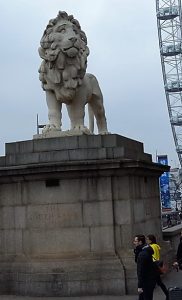
Coming up on the right, he told us, was one of the many lion statues on the banks of the Thames River erected during the reign of Queen Victoria. Upon inspecting it, Victoria realized this lion was quite obviously a male, so she ordered its gender identifying appendage removed for propriety’s sake. When one looked at the face of the lion in question, one could surmise he did not agree with Her Majesty. His eyeballs are perpetually bulging in surprise and discomfort.
At one point we left the tour bus and followed our elegantly dressed Stuart on a saunter through Green Park, a serene space stretching out in front of Buckingham Palace. Ducks and geese glided across the serene surface of its lake. Locals jogged along its backs and lay on the grass, soaking up blessedly warm rays from a late-March sun.
Stuart had our stroll perfectly timed to end at the entrance of Buckingham Palace and the changing of the guard. As a mere former colonist, I thought the changing of the guard consisted of a hand full of soldiers in their bright red jackets and giant black fur helmets; but no, it was a full-fledged parade with horses, drums and rifles.

Stuart was careful to point out these were not just young men and women who were chosen for their proficiency for formal procedures. These were soldiers who had served their country in Afghanistan and where they might serve again in the near future.
When the last soldier had moved on, we broke up into separate groups to explore more bits of English historic lore. This was when had to wave a fond adieu to Stuart. I wish he could have stayed with us, but I am sure he had to address another bus filled with impertinent American tourists.
I really wanted to know who his tailor was, although I was quite sure I could not afford his wardrobe.
Ireland and England with Jerry and Josh–I’ve Seen Than Place Before

The movie fan in me had a great time in London. It was like being on the set of an Alfred Hitchcock movie.
Josh and I saw Royal Albert Hall, which like Big Ben, had scaffolding over half of it. Of course that means London is taking care of its architectural wonders so they’ll be around for years to come for American tourists to photograph. Royal Albert Hall was one of the big stars in the Hitchcock 1950s movie The Man Who Knew Too Much. The man in question was James Stewart, and he didn’t know too much. The bad guys just thought he knew too much. The big climactic scene was in the performance hall. When the man clashed his cymbals, a prime minister was to be shot and killed. I don’t want to give away too much in case anyone hasn’t seen the suspense classic, but Doris Day foils the bad guys when she doesn’t keep her mouth shut.

The next landmark featured in a Hitchcock movie was a tall church with an unusual red and white brick pattern to it. I instinctively recognized it but could not remember where. Josh, who was our official photographer of record, quickly took the picture but then went on to his next subject without helping me think of the movie title. It was only after we came home and were watching Foreign Correspondent one night did we make the connection. The foreign correspondent played by Joel McCrea was about to break a big story about German spies in a pre-World War II peace group when an assassin tried to push him off the church tower. The assassin went on to play Santa Claus in Miracle on 34th Street. Now that’s what I call avoiding being type cast.
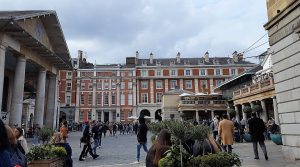
The third landmark from a movie actually goes back to a famous stage play. I rested in Covent Garden in the shadow of the portico with massive pillars featured in the opening scene of My Fair Lady. If my theatrical trivia serves me right, the same façade is used in the stage versions of My Fair Lady and the George Bernard Shaw play on which the musicals were based, Pygmalion. In the movie and the plays, the building was supposed to be a concert hall, but in actuality it is part of the front of a church.
Now it is the scene of street performers. The entertainer I saw was very talented but he needed some lessons of audience appreciation. First he laid out a red rope at the perimeter of his performance area on the church steps and the cobblestone street in front of it. Woe be unto anyone who walked across the rope once the act began. One woman walked across it three times, and each time the acrobat with the wooden pins and sharp knives became more vituperative (it’s a British word; look it up) when she broke the rules.
“She’s so rude,” he announced to us, “that she doesn’t even know she’s rude.”
And I don’t think she did either. I know I was so scared by this point I didn’t dare scratch my nose. After his big finale I thought we spectators were safe from his acid tongue but I was wrong.
“I’m forty-eight years old and got a family to support here, so you can let go of some change,” he yelled. “Hey you! You mean you’re going to watch my show and walk away? You didn’t even applaud! The least you can do is toss a few coins in my hat!”
I took a fist of coins –I don’t know how much they were worth—put them in his hat and quickly exited stage right.
If Eliza Doolittle had been that aggressive in selling her flowers she wouldn’t have had to take those elocution lessons.
Ireland and England with Jerry and Josh–Touring Crazy Town
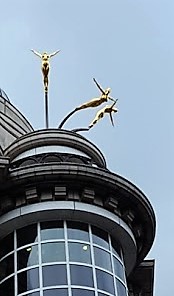
If you are going to one of the most exciting, eclectic cities in the world, go ahead and jump out of the bus into the heart of crazy London town and go for it.
The tour bus dropped us in Piccadilly Circus, and the guides told us to try to keep up. I knew immediately this was going to be difficult because how can you follow two typical English people in a crowd of a hundred thousand typical English people.
For the first thing, I was distracted by this building that had four gorgeous bronze statues of young nubile naked women diving into the center of Piccadilly Circus. Perpetually with their arms extended, up on their tippy toes, backs straight, tummies tucked in and chests proudly puffed out. I may be 70 years old but I’m not dead. By the time I realized I was supposed to be following the group, they were already across the street.
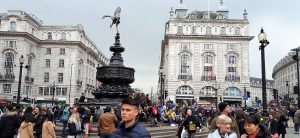
This presented me with my second problem. By nature I am always the one to step back with a smile and allow the cross pedestrian traffic to proceed. I have been known to hold open a door so long, people thought I worked for the store. If I did that in the middle of Piccadilly Circus, I would lose sight of my group and never see the Spanish moss draped live oak trees in downtown Brooksville, Florida, again. Then I remembered the grumpy old Irish woman with her walker in Dublin. I put a scowl on my face, hunched my shoulders and bulled my way forward. Before I knew it I was back with my group and I don’t think they had realized I had gone away.
This was very important to me. I’m old enough to be the grandfather of the young people on this student tour. The last thing I wanted was to have them interrupt their good time to see if the old man was lost, gasping for air, or fallen over with a heart attack. I didn’t want anyone to say, “Somebody call 9-1-1 and get the old geezer off our backs.” (Okay, they were all nice polite young American citizens and they would have never said that—thought it maybe. It’s a joke.)
Speaking of jokes, on the other side of Piccadilly was a street performer who looked just like Mr. Bean and for a modest price you could have your picture taken with him, hug him or pinch his bum. Twenty years and fifty pounds ago I was told I looked Mr. Bean. If I had moved to Piccadilly back then, think of the money and I could have made, and the bruises. Never mind.
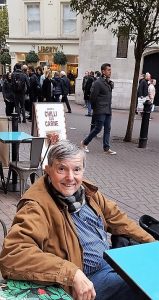
Finally we arrived on Carnaby Street where the tour guides told group members to be back in two hours to eat at an authentic English restaurant featuring Indian cuisine. First Josh and I walked down the street to the largest toy store in London. The entire basement was filled with Star Wars stuff. My son Josh, by the way, goes to Star Wars convention everywhere, so he was in hog heaven (an old Texas expression). I, on the other hand, had reached the end of my tether and decided to go back to Carnaby Street while he explored the other three floors of toy heaven.
For the first time that day I felt entirely in my element. I ordered a nice lemonade, sat on the café patio and watched beautiful people go by as though they were on a runway. Unattractive people were beautiful in their high fashion clothes and perfect hairstyles. Even the boys. I wanted to see Twiggy walk by. Beatle tunes lingered in my brain. Everything was the same as when I was a teen-ager in Texas, except nothing was the same. I was old. And all the fashionable folk had smart phones stuck in their ears.
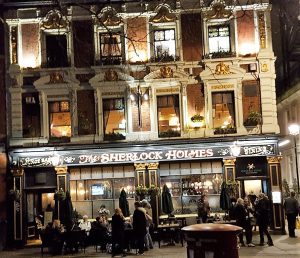
After dinner, the tour guides took us on one last marathon hike through Wellington Circle, past the National Museum and an establishment called Sherlock Holmes Pub. The tour guide said he used to work there. Finally we arrived at the Millennium footbridge over the Thames River where you could see the Eye (big Ferris wheel whose lights were down for the night) and Big Ben (which was covered in scaffolding and couldn’t be seen even if the lights were on.)
Don’t get me wrong. I had a great time. Who gets to walk the streets of glamorous London at night and not get lost? I didn’t have a heart attack. For someone my age that’s a great confidence booster.
Ireland and England with Jerry and Josh Stratford-on-Avon Except We Never Saw the Avon

I always like me some literary insight while I’m having fun.
Our tour bus stopped at Anne Hathaway’s cottage in Stratford. We had to wait in line because we arrived a little before they unlocked the door. We could have been distracted by beautiful blooms in the garden but the plants hadn’t budded yet.
I think everyone has seen a picture of the Hathaway house but we took one anyway. Yes, it has a thatched roof. Yes, it is a long two-story house. Yes, it is bigger than you thought, but not that big. For the sixteenth century it has a lot of nice things, including beds.
Speaking of beds, the guide explained the whole thing about how William Shakespeare left his wife his second best bed in his will. Admit it, we all thought Will was a cad for leaving his wife the second best bed. Just like most sound-bites in history, there’s much more to the story.
Back in those days, there weren’t very many inns in the countryside, and many people in the country, whether they liked it or not, had to take the trip to London once in a while and had to stay somewhere along the way. To make a little money, most people rented out a bed to weary travelers. And which bed would you want a stranger with money to have? The best bed in the house, of course, so it had to be empty and clean at all times just in case someone knocked at the door.
So the head of the family used the second best bed, which probably was the marriage bed. A romantic gesture to leave to your wife, when you think about it. Also a financially sound one too. The best bed was still available to rent out to travelers, which continued to be a source of income for the widow.
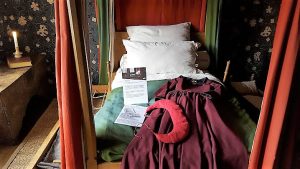
We also thought Will was some illiterate ragamuffin who spied the girl in the big house down the road and decided to marry her. Then we saw his birthplace house. It wasn’t all that small. His father was a successful tradesman, so the ragamuffin theory went out the window. We did see the bed where Will was born and it was as nice as any bed in the Hathaway house. Both houses had lovely gardens.
Josh and I walked a few blocks away to the site of the house that Will built for Anne. It had burned down and the lot is now a playground with a nice marker in it. Will always said, “The play’s the thing….”
This is when I realized why Will left his family in Stratford when he went off to work in theater in London. If you had a choice of living in a pretty country town with a nice house and garden or in rat-infested, plague-ridden London with all sorts of unnamable waste in the street, wouldn’t you want to be in Stratford too?
So instead of being this lowlife scum who abandoned his poor family for a glamorous show biz life in the big city, he left them safe and happy among friends and family to try to make a living from the only talents he had, writing and acting. And he could only do that in London.
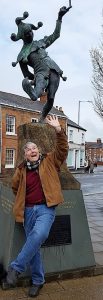
After I got mired down into university course Shakespearean Tragedies 303, I saw a statue of a court jester in the middle of the street. Will had a buddy in his acting troupe who was really funny so he wrote a role for him in every play, whether it made any sense or not.
To get into the spirit, I had Josh take a picture of me trying to imitate the pose of the jester who had both hands in the air and one leg up. But I lifted the wrong leg so it didn’t make any sense at all.
Mission accomplished.
Burly Chapter Seventeen
(Previously in the book: For his fifth birthday Herman received a home-made bear, which magically came to life when Herman’s tear fell on him. As Herman grew up, life was happy–he liked school and his brother Tad was nicer. But mama died one night. Papa decided sister Callie should go live with relatives.)
Late one afternoon in the loft Herman was having a nice long talk with the two bears when he heard the front door open. “Uh oh. Tad’s brought Leonard and Stevie home with him again.”
“Don’t get upset before they even say anything,” Burly Senior told him.
“Who knows?” Burly added. “They might even be nice to you today.”
By that time the three teen-aged boys were climbing the ladder, giggling poking at each other. They stopped short when they saw Herman.
“You here?” Stevie growled.
Leonard walked over and poked Herman in the shoulder. “Don’t you know? He’s always here because he’s too weird for the other kids to play with.”
Stevie glared at Herman, his hands stuck in his pockets. “Doesn’t he have chores?”
“I did my chores,” Herman replied, looking out the window.
“Then go find papa and ask him to give you something to do,” Tad ordered. “Get out of here. We want to talk.”
Leonard picked up Burly’s red wooden car and examined it. “What’s this?”
Tad glanced at Herman. “Just one of the kid’s toys.”
Laughing, Leonard ran its wheels on the floor. “Hey look! A smash up!” Then he ran the car into the side of the wall, causing it to splinter into small pieces.
Herman twitched but said nothing.
“Leonard, you’re such a jerk,” Tad spat.
His friend shrugged. “Big deal.”
Herman jumped off the bed and headed toward the ladder with Burly under his arm.
“Boy, you don’t go nowhere without that bear stuck under your arm, do you?” Leonard sneered.
“How old is he?” Stevie asked Tad.
Tad shifted uneasily on his bed. “Heck, I don’t know.”
Leonard leaned down into Herman’s face and smiled a stupid grin. “Just how old is the eety-bitty boy?”
Herman felt his neck turn red hot. “Eleven.”
“Don’t you think that’s a little old for you to be carrying around a doll?” Stevie asked.
“Burly’s not a doll,” Herman corrected him. “He’s a bear.”
“Ooh, that’s a big difference,” Leonard said with a snort. “No wonder no decent kid will play with you. You’re still a baby with his dollie.”
“Stop it, Leonard,” Tad ordered.
Leonard looked around at Tad who was glaring at him. After a while Leonard walked over to the bed and picked up Burly Senior. “You might as will take your other dollie, too.”
Without thinking, Herman blurted out, “Oh no, that’s Tad’s.”
As soon as the words were out of his mouth Herman knew he had made a mistake. He looked quickly at Tad who turned a bright shade of red.
Leonard smiled and his eyes twinkled, as though he had found fresh meat to bleed. “You mean little Taddie Waddie sleeps with a dollie?”
Stevie grinned but didn’t say anything, only snorted. Before anyone could say more Herman scurried down the ladder and out the front door. Herman ran to the barn and hid in the farthest, most dimly lit corner. “Oh, why was I so stupid?” he berated himself.
“You weren’t being stupid,” Burly corrected. “You were being honest. That’s what you are.”
“But I shouldn’t have said that in front of Tad’s friends,” Herman continued. “Did you see how red he was? Those boys are really going to make fun of him. And then he’s going to let me have it.”
“Yes, Tad did look embarrassed,” Burly agreed. “And his friends will probably tease him. And there’s a good chance he will fuss at you. But you know what? After it’s all over, you’ll still be Herman and Tad will be Tad. You’ll go on letting the truth tumble out of your mouth. And Tad will get mad too easily. But you will keep on living.”
Herman looked down at the dirt. “I guess so.”
In a few minutes Herman heard the three boys leave the house and run down the road. Then he remembered it was his turn to cook supper that night. Herman scurried into the house, put Burly up in the loft and rushed around the kitchen getting the food ready. At supper Herman watched Tad out of the corner of his eye. He half-way expected Tad to get even by complaining about the food, but he didn’t.
“Good vittles, son,” papa mumbled.
“Yeah, not bad,” Tad added.
Again Herman tried to tell by Tad’s voice if he were angry. He didn’t sound angry, but his voice didn’t sound normal either. Herman couldn’t figure it out. After they ate, Tad helped wash and dry the dishes. He was strangely polite but seemed to be somewhere else, somewhere very sad. “Thank you for helping with the dishes,” Herman said.
Tad walked away without looking at him. “Think nothing of it, kid.”
That night, when all was quiet, Herman roused Burly. “I don’t understand what’s the matter with Tad. I thought he was going to be mad at me.”
Burly stifled a yawn. “That surprised me too. Maybe papa can help us figure it out. I think he knows more about Tad than either of us.” He waited a moment, then whispered, “Papa?”
There was no reply.
“Papa?” Burly repeated.
Only silence answered him.
“That’s strange,” Burly said. “Papa always joins in on talks.”
“Let me see if he’s over there.” Herman tiptoed over to Tad’s bed. As well as he could see in the dark, Herman couldn’t find Burly Senior. Usually he was tight within Tad’s arms close to his chest, but not tonight. Herman got returned to Burly. “He’s not there.”
“That’s odd.”
The two of them decided to look for him the next day after helping papa in the fields. In the morning Herman left Burly in the loft as he always did and went to the cotton field with papa and Tad. The hours went by slowly as he hoed the weeds away. Later that afternoon papa walked by.
“That’s all for today,” he said and kept on walking.
Herman scampered back to the house and got Burly. First they looked under Tad’s bed, thinking Burly Senior might have slipped under there. Then they looked in the big old trunk at the end of the room where mama and papa kept special things, like stacks of old letters tied with pink string, the dress mama was married in and yellowed photographs of stern, erect people Herman didn’t know. Burly Senior wasn’t there either. “There’s only one thing left to do,” Herman said with a sigh. “That’s to ask Tad.”
“You’re very brave to do that,” Burly replied. “Will you ask him after supper tonight?”
“No,” Herman answered as he carried Burly down the ladder. “I’m going to ask him now.”
They went down the dirt road toward the field but stopped abruptly when Burly gasped, “Oh no!”
Down on the ground, in a trench was a mass of torn burlap. Down feathers, wadded up for stuffing was strewn everywhere. And a burlap ball, with buttons sewn on it, was smashed flat.
“Papa,” Burly whispered.
Herman kneeled down by the remains of Burly Senior. He picked up the different pieces, a torn patch that was his chest, little puffs that were his arms and legs, and the flattened ball that was his head. He whispered to them, cried over them, but they were just pieces of burlap now. The life was out of them, stomped out.
“Did Tad do this to my papa?” Burly asked.
“Yes. Or he stood by and watched Leonard and Stevie do it,” Herman said, trying to hold back the tears. He looked down the road at the field. “I’m going to let him have it for this.”
“No,” Burly ordered. “You can’t say anything.”
“Why not?”
“Because papa belonged to Tad,” Burly explained with difficulty. “Even though he was my papa and he was your friend, he belonged to Tad. And Tad could do anything he wanted with him.”
Herman glared down the road a moment and sighed. “I suppose you’re right.” Then they walked home without a sound. No words were spoken during supper either. Herman could tell Tad was avoiding looking at him. Now he knew why Tad was strangely polite and quietly sad. Tad knew what he had done, and he couldn’t face Herman. That night Herman couldn’t sleep. He kept seeing Burly Senior smashed on the side of the road, never to speak to him again or give him wonderful advice.
“Oh Burly,” Herman asked. “Why did Tad do it?”
“Tad’s growing up. Maybe he thought papa was holding him back in childhood. Maybe he decided grown up boys don’t hug a bear at night.”
“That’s stupid,” Herman said, spitting the words out.
“No,” Burly corrected him. “That’s human.” He paused and snuggled close to Herman. “When it comes time for you to grow up, you won’t do that to me, will you?”
Herman sat up. “No sir, Burly. You’ll always be with me. If doing without you means growing up, then I won’t grow up!”
“Oh no, you’ve got to grow up,” Burly said. “I want you to grow up. It’s just that I’m scared about what’s going to happen to me.”
Herman hugged Burly tightly. “Don’t worry. You’ll always be with me.”
But Burly wondered, as Herman fell into a deep sleep, if his friend would be able to keep his promise.
Ireland and England with Jerry and Josh Lost in Dublin
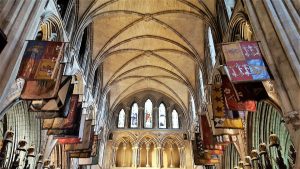
I always thought the best way to know a city is to get lost in it. Well, I must know Dublin like the back of my hand.
A nice lady led a tour bus excursion through Dublin for us. She pointed out the parliament building where people talk a lot but don’t get anything done. Sounds like back home. She took us through the large Dublin public park which had a huge obelisk, the equivalent of our White House and a giant cross where Pope John Paul II held mass several years ago. This piqued my imagination so Josh and I got out of the bus to walk up to the platform in front of a giant meadow. I think I could imagine a million people there. Pope Francis is scheduled for a visit next year so I suppose he will draw a million parishioners too. After that, the bus drove downtown where the Irish Rebellion began in the early 1900s at the post office. You can still see bullet holes in buildings and statues everywhere.
The bus then took us to St. Patrick’s Cathedral where all the famous authors are interred. The church had an astounding collection of wood carved saints along the walls. Flags hung everywhere. Famous stones were on the floor everywhere. We heard contradictory stories about who the woman buried next to Jonathan Swift was. One source said she was a close relative who was a companion but nothing more. Another source said she was a close relative who was his wife but not legally; no one ever said anything about it to him personally because, after all, he was Jonathan Swift.
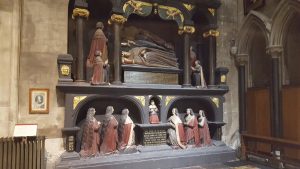 The bus next let us out at the juncture of five streets and told to be back in a couple of hours. Trinity College was nearby so our group went to the library where the Book of Kells was housed. The Book of Kells is the earliest known transcription of the four gospels of the Bible. We had to stand in line outside in the cold for a while before we were admitted. There were several joggers going by in their t shirts and shorts. Other students were sitting outside eating lunch. Others played table tennis on the green. That’s what I call being acclimated to the weather. I saw one young man have his a thick stack of papers blown from his hands across the campus. I hope that wasn’t his doctoral thesis. Once inside the library I was impressed by the high rows and rows of every book ever published in Ireland. The light streaming through the windows made them look golden. By the time I made my way to the room to the Book of Kells, I was informed access was closed because of a security system failure. I hadn’t been outside but a few minutes when word filtered out the glitch had been corrected and the room was now open. By this time I would have had to go to be back of the line again to enter the building. So I sat on the steps in the cold waiting for the rest of my group to come out, after they had observed the historic book. At least I didn’t have to witness another thesis blown to kingdom come.
The bus next let us out at the juncture of five streets and told to be back in a couple of hours. Trinity College was nearby so our group went to the library where the Book of Kells was housed. The Book of Kells is the earliest known transcription of the four gospels of the Bible. We had to stand in line outside in the cold for a while before we were admitted. There were several joggers going by in their t shirts and shorts. Other students were sitting outside eating lunch. Others played table tennis on the green. That’s what I call being acclimated to the weather. I saw one young man have his a thick stack of papers blown from his hands across the campus. I hope that wasn’t his doctoral thesis. Once inside the library I was impressed by the high rows and rows of every book ever published in Ireland. The light streaming through the windows made them look golden. By the time I made my way to the room to the Book of Kells, I was informed access was closed because of a security system failure. I hadn’t been outside but a few minutes when word filtered out the glitch had been corrected and the room was now open. By this time I would have had to go to be back of the line again to enter the building. So I sat on the steps in the cold waiting for the rest of my group to come out, after they had observed the historic book. At least I didn’t have to witness another thesis blown to kingdom come.
We walked several blocks to the Natural History Museum. This place had the longest dugout canoe I have ever seen. I thought the ones in Cherokee, N.C., were long but this one had them beat. The museum also had the remains of a man mired in a bog for several centuries so he was very well preserved. I imagine that was what I looked like when I curled up in bed that night. I would definitely recommend this museum to anyone who only had a couple of days in Dublin and was interested in stuff bogged down in history. Next we went to the National Museum of Ireland. We had passed both of these places on the bus and I thought it was right next door. Next to the back book. On another street. This gallery is where we were all separated. Exhibits didn’t exactly flow smoothly from one to another. It was more like enter a long white hall and try to guess which door to take to the next collection. All the art was breathtaking, but it wasn’t easy to get to.
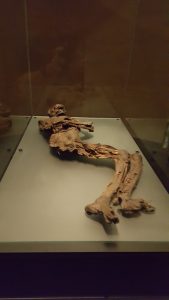
Our group then split up for some shopping. Josh and I were told about one place that was like an American convenience store but with healthier snacks. We walked back to the juncture of the five streets and looked up each one but couldn’t find it. After we placed a call to my teacher friend she directed us right to it. We had passed it several times. Josh and I felt sure we could make it back to the meeting point at the five streets. Josh found them. I walked right on past. I thought we were meeting another of the five corners. When I finally met up with everyone I spied an authentic old Irish drunk staggering by. To end the day we hiked to a restaurant for dinner. As we waited outside, I looked behind me I saw an old Irish woman with her three-wheeled walker wordlessly bumping into everyone’s legs to get through. The intimidating look on her face told us to gang way.
I wonder if she were married to the old drunk? Maybe she was the reason he drank too much.